- Home
- Georgette Heyer
Acting on Impulse Page 7
Acting on Impulse Read online
Page 7
“Of course I did! It’s true, too. Well, I’ll see what I can do for you in the matter of Burton, Caryu’s secretary, that you were asking about. Anything else?”
“No, not at present, thanks. I must be getting along.”
Winthrop laughed, and held out his hand.
“I’ll see you tomorrow, I suppose?”
“Oh, I’m sure to come along to report,” Linckes answered, and went out, his temples throbbing with excitement.
IV.
A MONTH later Linckes was shown into Caryu’s study. Caryu looked at him hopefully, for there was a glitter in Linckes’ eyes, and a very purposeful look.
“You’ve got a fresh suspicion?” he said, with the glimmer of a smile.
Linckes sat down opposite him.
“Yes, sir, I have. And I’ve come to ask your help.”
“Have you, indeed? I’m sure I have to imitate the famous Watson, haven’t I? I shall meekly do your bidding, being myself quite in the dark.”
Linckes laughed.
“That is about the size of it, sir,” he confessed. “But I really believe I’ve got on to the right track at last.”
“Any clue?”
“No, sir. Pretty strong suspicion, though.”
A shadow crossed Caryu’s face.
“Only a suspicion, Linckes? I seem to have listened to so many.”
“This time it amounts to a conviction, sir. And, because I’m practically certain in my own mind, I’m going to have the cheek to ask you to do something that’ll seem quite insane to you.”
Caryu moved a paperweight uncertainly.
“I’m not at all sure that I shall comply, then. What is it?”
Linckes clasped and unclasped his fingers rather nervously.
“Sir, you’ve got the plans of the new plane here, haven’t you?”
The elder man smiled a little.
“You ought to know, Roger. You and your colleagues are supposed to be keeping an eye on them. But if you imagine they can be taken out of this new safe, you’re wrong. No one knows the secret of the combination except myself.”
“I know, sir. I don’t expect the thief to attempt it. I want you to tell Sir Charles, when you see him tomorrow, that you have made one or two suggestions on the plans, and are sending them by your secretary to his house for him to see.”
Caryu reddened.
“What are you driving at?” he asked levelly. “What do you mean?”
“Just that, sir. I think Mr. Fortescue carries documents to Sir Charles’ house fairly often? Minor documents, I mean.”
“Certainly. But I do not understand—”
“I know, sir. I want you to give Mr. Fortescue a package containing blank sheets. Keep the plans in your safe.”
Caryu drew himself up. “Linckes, you must please explain yourself. I don’t know what crack-brained notion you have got into your head, but if you are insinuating that Sir Charles is the criminal, I may as well tell you that it is an impertinent and foolish suggestion.”
“I’m not insinuating anything, sir. I can’t even tell you who I suspect. But I do beg of you to just do as I ask without mentioning my name. It can’t do any harm, and I believe it’ll enable me to find the man who’s betraying us all.”
Caryu’s face softened a little.
“You think that whoever is doing it will try to intercept Fortescue on his way to Winthrop’s house? It is rather improbable, isn’t it? He has only a few yards to go.”
“That’s just what I’m counting on, sir. It’s too short a distance for him to take a taxi. He doesn’t, I know, for I’ve often been with Winthrop when he has come over with a letter for you, or, as I said, some minor document.”
Caryu was silent for a moment. He looked Linckes over, frowning.
“And when Fortescue comes to Winthrop and gives him a package of blank sheets,” he said sarcastically, “what am I to say to Winthrop? You don’t seem to understand that if that happens my action in sending blank sheets amounts to a very serious insult.”
“No, sir. If Fortescue does arrive, unmolested, and with the blank sheets, you can explain why it was done. You don’t suspect Sir Charles. I haven’t said that I do. It’s quite simple.”
Caryu smiled faintly. “Very well. I will tell Winthrop that among other things I am sending him the plan of the new ’plane. Are you satisfied?”
“Yes, sir. Thank you!”
Linckes rose and prepared to depart.
“What happens if Fortescue is sandbagged?” inquired Caryu. “What will he think of your little plot?”
“Not much chance of that, sir,” Linckes grinned. “From Park Lane to Arlington Street isn’t a far cry, and it’s never exactly deserted. But don’t tell Fortescue anything, will you? Not even that you are supposed to be sending plans. Send him off at the usual time.”
“‘The usual time’ covers a wide margin,” remarked Caryu. “I shall send him at about six in the evening. That is the most usual time.”
“Then tell Winthrop, sir, casually. And thanks awfully!”
He shook Caryu’s outstretched hand, and went to the door.
“Mind you, I think you’ve got a bee in your bonnet,” Caryu warned him. “If you haven’t—well, it’ll be a fairly large feather in the bonnet instead.”
V.
“GOT another fit of the blues, Winthrop?”
Sir Charles looked up, smiling.
“Getting rather frequent, aren’t they? Sorry I’m such a surly brute. It’s very nice of you to consent to stay and dine with me.”
Linckes leaned back in his chair, crossing his legs.
“It’s jolly nice of you to ask me,” he retaliated. “I don’t wonder you’re feeling depressed.”
Winthrop gave a short sigh.
“’Tisn’t very surprising, is it? We don’t seem to get any forrader, do we? Since your ingenious Burton theory there haven’t been any fresh suspicions, have there?”
Linckes turned sharply. Caryu’s secretary had just come into the room. Linckes looked him over quickly, conscious of a sinking sensation of disappointment somewhere in the region of his stomach.
“Good-evening, Sir Charles! Mr. Caryu sent me with one or two things for you to sign.”
Winthrop had risen.
“Yes, that’s right. Oh, don’t go, Linckes! It’s nothing private.”
Dully Linckes watched Fortescue lay his dispatch-case on the table and insert a key into the lock. After a moment’s twisting and turning he drew it out again and looked up at Winthrop, rather white about the mouth.
“Funny!” he said uneasily. “It won’t open!”
Linckes’ heart leapt. He lounged back at his ease, outwardly careless, but his eyes never left Winthrop’s face.
“Won’t open? Perhaps you’ve got hold of the wrong key?”
“No; it’s a special lock and key.”
Fortescue’s eyes were rather wide.
“Then something must have gone wrong with the lock,” said Winthrop impatiently. “You must force it.”
“Ah!” Relief sounded in the secretary’s voice. “That’s it, of course. I got hung up on one ‘island’ in the middle of Piccadilly, and when half the people surged forward into the road there was a bit of a scrum, and I dropped the case. I suppose that did it.”
“You dropped it?” Winthrop asked. “Rather careless, surely!”
Fortescue flushed.
“Yes, Sir Charles. But it fell at my feet, and I’d picked it up in a flash.”
“I see.”
Breathlessly Linckes watched the secretary burst open the lock.
“Mr. Caryu told me to ask you to run through his memorandum concerning the Crosstown Barracks, sir. Here it is!”
He was turning over some long envelopes. One of these he handed to Winthrop, who took it and pulled out several folded sheets. There was a moment’s silence, broken only by the crackle of paper as Winthrop spread open the papers. Then Linckes saw Sir Charles look up sharply at Fortescue,
the lines about his mouth suddenly grown stern.
“Ah, yes!” he said quietly. “Anything else?”
“Yes, sir. Mr. Caryu placed several documents in the case. I don’t know what they were, but he told me to give—”
“Give them to me, please. Thank you!” Winthrop cast a hurried glance at each of the sealed documents handed to him. Then he laid the whole sheaf down upon his desk, and shot the secretary a long, keen look. Lastly he turned to Linckes.
“This is a case for you, I think,” he said.
“Oh!” Linckes sat up. “What is the matter?” He looked inquiringly from Winthrop’s impassive countenance to the secretary’s surprised, vaguely nervous expression. “Anything wrong?”
“A very great deal. Come and look at these documents. You too, Fortescue.”
Linckes went to the table and spread open the various sheets. Looking over his shoulder, the secretary gave a startled gasp. But Linckes’ heart was beating madly. Every sheet was blank, not only the supposed plans.
“Good heavens!” he said.
“Exactly!” Winthrop turned to Fortescue. “Mr. Fortescue, I saw Mr. Caryu this morning. He informed me that he was sending certain important papers. Did you know this?”
“No, Sir Charles. Oh, heavens! Surely—”
He broke off, staring blankly at Winthrop.
Winthrop sat down at his desk.
“Your case was stolen, Mr. Fortescue. Presumably when you dropped it in Piccadilly.”
“But—but, Sir Charles, it was only on the ground for an instant. Besides, who could know that the case contained anything important?”
“I’m afraid I cannot tell you that,” Winthrop said coolly. “Will you please try and remember the exact circumstances of your dropping it?”
“I—I crossed to the ‘island’, Sir Charles, and waited for the stream of traffic to pass. There — there were a good many people on the ‘island’, and, as I said, there was a lot of pushing and barging. There was a stout woman who rather lost her head and tried to make a dash for the other side of the road, and had to get back again to the ‘island’ in a hurry. She must have pushed the man standing next to me. Anyway, he fell against me, and I lost my balance, and—and I dropped the case.”
“And this man,” said Winthrop. “Was he by any chance carrying a dispatch-case?”
The secretary moistened his lips.
“I—I’m afraid I didn’t notice, sir. I dare say he was. It was at an hour when most men are coming away from business, and— Oh, heavens!” He ended on a stricken note. “What a fool I am! What a damned fool! If only I’d known that there were important papers in the case! Sir Charles, it—they—they weren’t the new plans?”
“That is precisely what they were,” Winthrop answered.
He unhooked the receiver from the telephone and called a number. While he was waiting to be connected he glanced at Linckes, smiling rather wearily.
“Well, here’s your chance, Linckes. And he’s got away with it, the scoundrel! Hallo! Is that Mr. Caryu’s house? Put me through to him, please. Winthrop speaking. Thanks!”
Again there was a pause. Then he began to speak into the telephone. Quite calmly he told Caryu all that had happened. At the end he hung up the receiver and nodded to Fortescue.
“Mr. Caryu wants you to go back, Fortescue.”
Some of the pallor left Fortescue’s face.
“Mr.—Mr. Caryu doesn’t suspect me, sir?”
“No. You’d better get along as fast as possible. Tell Mr. Caryu that I shall come round at once.”
“One moment!” interposed Linckes. “Can you remember what the man who fell against you looked like?”
“Just—just ordinary,” answered the unhappy secretary. “He was middle-aged, I think, but I won’t swear to it.”
“I see. Thank you! Winthrop, I won’t stay to dinner, if you’ll excuse me. I’ll get right on to this at once.”
Winthrop nodded.
VI.
IT was close on eleven o’clock that same evening, and Arlington Street was very quiet. One or two people passed down the road, and presently someone left Winthrop’s house and went away in a large limousine. Several people had visited Sir Charles that evening, and he himself had returned from Caryu’s house shortly after eight.
For some time after the last visitor had departed there was silence in the street, and then the chunk-chunk of a London taxi made itself heard, and in a few moments a car drew up outside No. 10. A man in an overcoat and opera hat got out, paid the driver, and mounted the steps to the front door. He pressed the bell, and stood waiting to be admitted. He was a medium-sized man, inclined to stoutness, and with a short, grizzled beard. The butler opened the door.
“Is Sir Charles in?” asked the newcomer. His voice was rather hoarse and guttural.
“Yes, sir. But I don’t think he’s seeing anyone else today.”
“Would you ask him if he will give me a moment?”
The man handed John a card. The butler read it.
“Oh, Mr. Knowles, sir! I beg your pardon! Will you come in while I see if Sir Charles is still up?”
Knowles entered the house, and the door closed again.
From the shadowy depths of the area two men rose stealthily, and crept up the steps to the street.
“Got him!” Linckes whispered. “Your revolver ready, Tomlins?”
His companion nodded.
“Yes, it is. Wish I knew what you’re about.”
“You soon will know," said Linckes grimly. “Your men are prepared?”
“Inspector Gregory’s at the back of the house, Mr. Linckes, and Inspector Marks is just down the road. He’ll come up to the house with Sergeant O’Hara as soon we get in.”
“All right. Don’t forget that all you’ve got to do is to follow me and to do as I say instantly.”
“No, sir. Carry on!”
Linckes ran lightly up the steps of the house and rang the bell. After a short pause the door was opened.
“John, is Sir Charles up?”
“Yes, sir. Oh, is it you, sir? Come in!”
Linckes walked into the hall, followed by the other detective. John looked at Tomlins surprisedly.
“Sir Charles is engaged just at the moment, sir. But if you’ll wait—”
“Oh, is he? We’ll just wait here, then. Don’t bother to stay, John.”
He turned to Tomlins.
“The library is at the bottom of this passage. It’ll be locked, and we shall wait in absolute silence outside. There are two men in the room, and when they come out you are to cover Sir Charles Winthrop. Leave the other to me. See?”
“Can’t say I do, sir. But I’ll do as you say, of course.”
“Then follow me. Not a sound, remember!”
In perfect silence the two men took up their stations on either side of the library door, revolvers held ready. The murmur of conversation could be heard within, and although neither Linckes nor Tomlins could distinguish any word spoken, they could hear that the talk was worried.
Then, after what seemed an interminable time, the key scraped in the lock, and Winthrop opened the door. Behind him stood the man Linckes had seen entering the house a few minutes ago.
For a moment there was dead silence as Winthrop stared haughtily from one levelled revolver to the other. Even now Linckes could not but admire the indomitable courage and sang-froid that Sir Charles displayed.
“Really, Mr. Linckes!” he said, faintly amused. “May I ask what you think you are doing?”
“Hands up, please!” Linckes said sternly. “If you attempt to escape I shall shoot!”
Winthrop shrugged slightly, and raised his hands. Still he preserved that air of haughty bewilderment. But the man beside him had grown very pale, and was biting his under-lip. The hands that he held up were trembling.
Linckes advanced into the room, covering his man.
“I may be doing you a grievous injury, Sir Charles, but I do not think so.” With his free h
and he drew a silver whistle from his pocket and blew three shrill blasts upon it. “Mr. Winthrop, will you be so good as to remove your wig and your beard? Your make-up is excellent!”
Disregarding Tomlins’ levelled revolver, Sir Charles lowered his hands. He sank down into his chair, and regarded Linckes with a twinkle in his eye. His fine lips smiled generously.
“Do tell me how you found out,” he said pleasantly. “Take the wig off, Alec. The game’s up!”
With starting eyes Tomlins watched the pseudo Mr. Knowles tear off his wig and beard. Night black hair with a faint crinkle in it was revealed, and when the man had rubbed his face with his handkerchief, removing most of the cunning make-up, the detective’s jaw dropped.
“Sir—Sir Charles!” he gasped. A little, low laugh came from Winthrop.
“Wonderful, isn’t it? Quite difficult to tell us apart.” He paused, listening to the sudden pandemonium without. “Well, you’ve roused the whole household, Linckes, and I suppose your assistants are even now invading my house. You must allow me to congratulate you. I never thought you’d discover me. And I’ve had a fair run for my money, haven’t I? I don’t regret it a bit. Poor Alec’s looking rather glum. But then he always was rather peevish. That was what made you suspect me in the first place, wasn’t it? Jolly clever of you to think of that blank sheet scheme. I ought to have guessed, of course. Fact of the matter is, you took me in. I didn’t think you suspected me.”
VII.
TONY dabbed at her eyes, and gave a tiny sob.
“It’s so awful, Roger! I c-can’t bear to think of Charlie doing such a thing. I—I just can’t realise it. It—it seems impossible!”
Linckes patted her shoulder uncomfortably.
“And—and somehow I can’t feel angry with him. He was always such a dear!”
“I know. He was just one of those people who couldn’t run straight. ’Twasn’t altogether his fault. And one must admire his courage.”
Tony was silent for a moment, still mopping her eyes.
A pair of soft arms stole round his neck.
“No; and I can’t help admiring you!” whispered Tony.

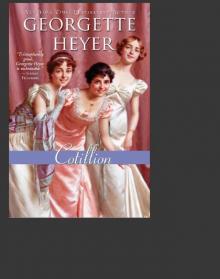 Cotillion
Cotillion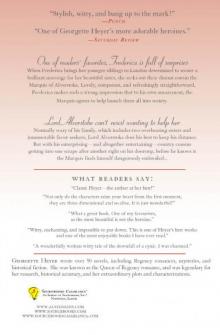 Frederica
Frederica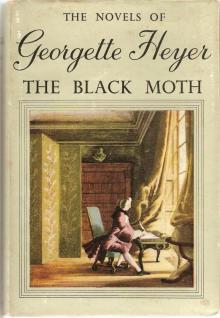 The Black Moth: A Romance of the XVIIIth Century
The Black Moth: A Romance of the XVIIIth Century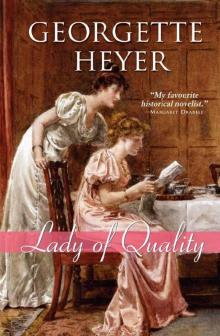 Lady of Quality
Lady of Quality Snowdrift and Other Stories
Snowdrift and Other Stories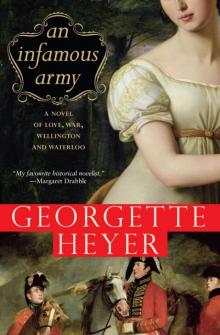 An Infamous Army
An Infamous Army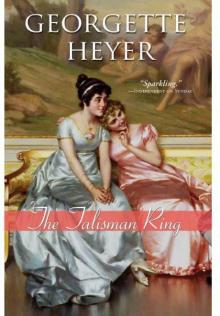 The Talisman Ring
The Talisman Ring Venetia
Venetia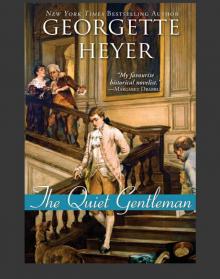 The Quiet Gentleman
The Quiet Gentleman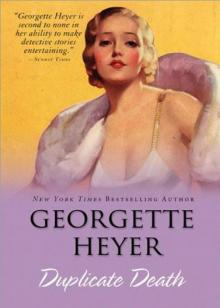 Duplicate Death
Duplicate Death Cousin Kate
Cousin Kate Black Sheep
Black Sheep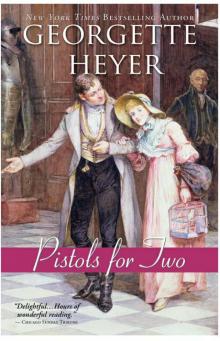 Pistols for Two
Pistols for Two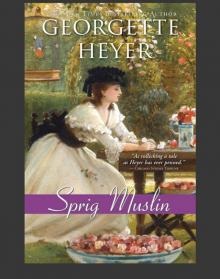 Sprig Muslin
Sprig Muslin No Wind of Blame
No Wind of Blame April Lady
April Lady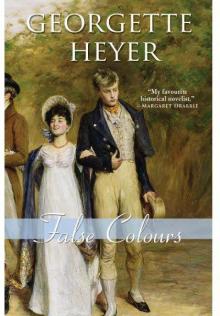 False Colours
False Colours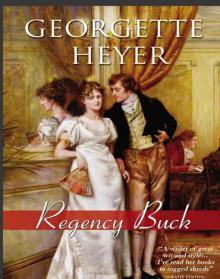 Regency Buck
Regency Buck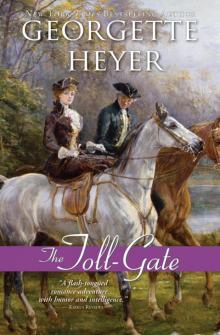 The Toll-Gate
The Toll-Gate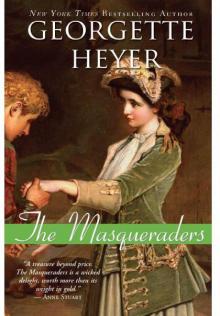 The Masqueraders
The Masqueraders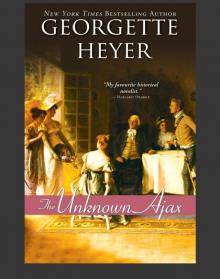 The Unknown Ajax
The Unknown Ajax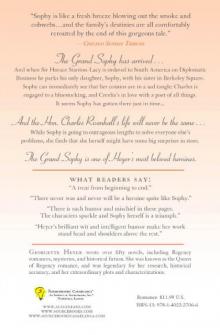 The Grand Sophy
The Grand Sophy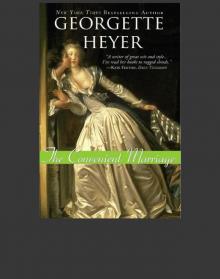 The Convenient Marriage
The Convenient Marriage Faro's Daughter
Faro's Daughter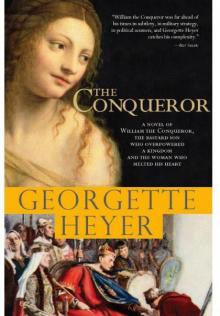 The Conqueror
The Conqueror The Foundling
The Foundling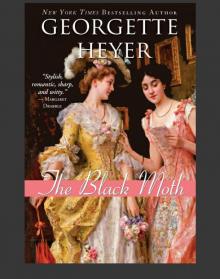 The Black Moth
The Black Moth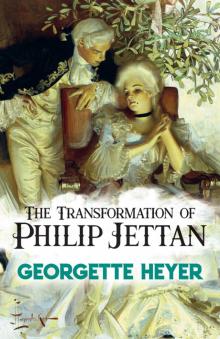 The Transformation of Philip Jettan
The Transformation of Philip Jettan Friday's Child
Friday's Child Beauvallet
Beauvallet They Found Him Dead
They Found Him Dead Charity Girl
Charity Girl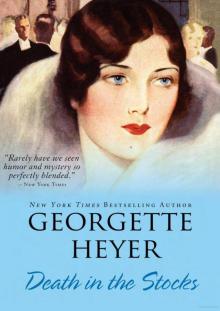 Death in the Stocks: Merely Murder
Death in the Stocks: Merely Murder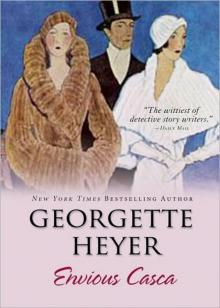 Envious Casca
Envious Casca Behold, Here's Poison
Behold, Here's Poison Arabella
Arabella The Nonesuch
The Nonesuch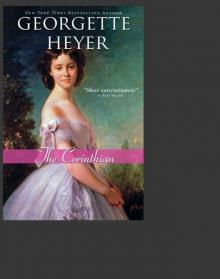 The Corinthian
The Corinthian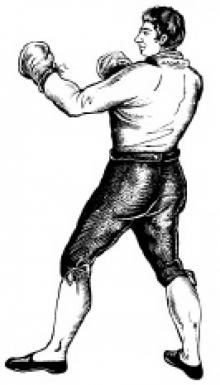 Jennifer Kloester
Jennifer Kloester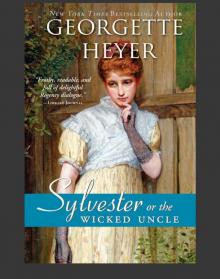 Sylvester
Sylvester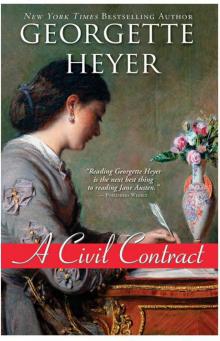 A Civil Contract
A Civil Contract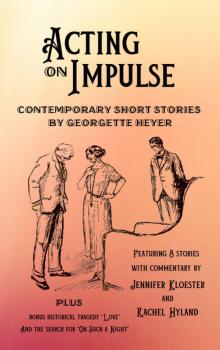 Acting on Impulse
Acting on Impulse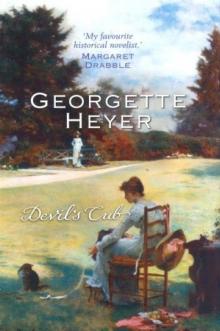 Devil’s Cub at-2
Devil’s Cub at-2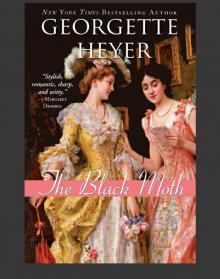 Black Moth
Black Moth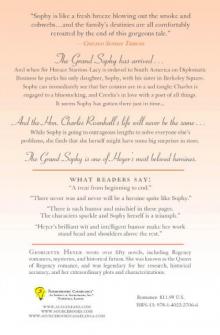 Grand Sophy
Grand Sophy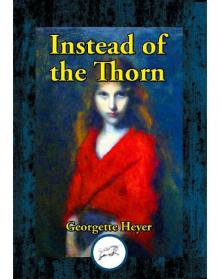 Instead of the Thorn
Instead of the Thorn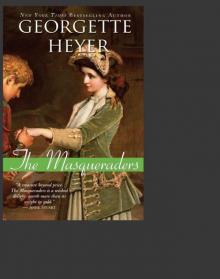 Masqueraders
Masqueraders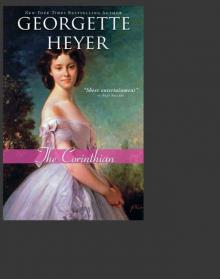 Corinthian
Corinthian Reluctant Widow
Reluctant Widow